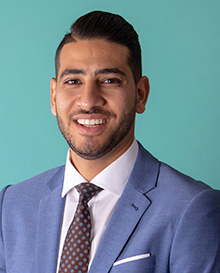Contact Us
From our portion sizes to our fast food options, obesity is a growing epidemic throughout the United States, placing about 70% of adults at greater risk for heart disease, diabetes, sleep apnea, and certain cancers. But losing weight is a difficult and often daunting challenge. Dr. David Shaker, an internal medicine physician with Shaker Medical Group, part of Holy Name Physicians, explains the different options available for long-term weight loss.
"We’re fortunate that we have great options to assist patients in losing weight and keeping it off, and more importantly, maintain a healthy lifestyle," Shaker says. "What many people don’t understand is that there is no one-size-fits-all approach to weight loss,"
News reports and social media posts have circulated recently about a popular and effective medication used to treat diabetes, which has also been shown to help with weight loss. Dr. Shaker confirms that there are many effective medications that can impact weight loss. He explains that they can affect the brain’s hunger center, helping to reduce hunger, appetite, and cravings. The medication also prolongs a feeling of fullness after meals. But, he cautions, the popularity of this medication for weight loss has become so widespread that there is a shortage of the life-saving medication for diabetics who need it to help control blood sugar.
Dr. Shaker says that medication for weight loss may or may not be the right option for everyone because being overweight or obese is different for each person.
People who have maintained a healthy weight for most of their life and then gained weight are more likely to reduce weight through diet and exercise. Weight loss can be achieved either by eating fewer calories or by burning more calories with physical activity, preferably both. Achieving healthy weight loss isn’t about a "diet" or "program" but a lifestyle with healthy eating patterns and regular physical activity. People should strive for a more balanced plan that focuses on fruits and veggies, lean proteins and whole grain carbs. And never cut calories too low (this causes your metabolism to slow, and you can start losing muscle mass).
Exercise is an important component as well, as physical activity increases the number of calories your body uses for energy or "burns off." In addition, exercise helps to ensure that your weight loss is from fat and not just stripping away muscle and bone density. Adults typically need 150 minutes of physical activity each week (for example, 30 minutes a day, 5 days a week), at a moderate intensity, like brisk walking, biking on level ground, or even pushing a lawn mower. And, of course, beyond burning fat, people shouldn't forget that exercise can have other impressive health perks, like improving the quality of your sleep, lowering your cholesterol and reducing your stress level.
Those who have struggled for longer periods of time with obesity and have been unable to lose weight through other methods might best achieve their health and fitness goals through surgical treatment options, also known as bariatric surgery. There are many different types of bariatric surgery, including gastric bypass, sleeve gastrectomy, and gastric band. These procedures all work by modifying your digestive system — usually your stomach, and sometimes also your small intestine — to regulate how many calories you can consume and change how the body absorbs food. They can also reduce the hunger signals that travel from your digestive system to your brain.
Long-term studies have shown that bariatric surgery typically results in significant and sustained weight loss as well as dramatic improvement and sometimes resolution of diabetes, hypertension, sleep apnea, and a number of other weight-related complications. But weight loss surgery isn't an easy "quick fix". It requires preparation beforehand and long-term lifestyle changes afterward to be successful.
Before beginning any weight loss regimen, Dr. Shaker recommends consulting with your primary care physician for a medical evaluation and then a conversation about what is the best option for you. "Our practice has been fortunate to have offered great options to assist our patients in losing weight and keeping it off. We work closely with each individual to determine which approach is best for them not only to lose the weight but to maintain a healthy lifestyle."


